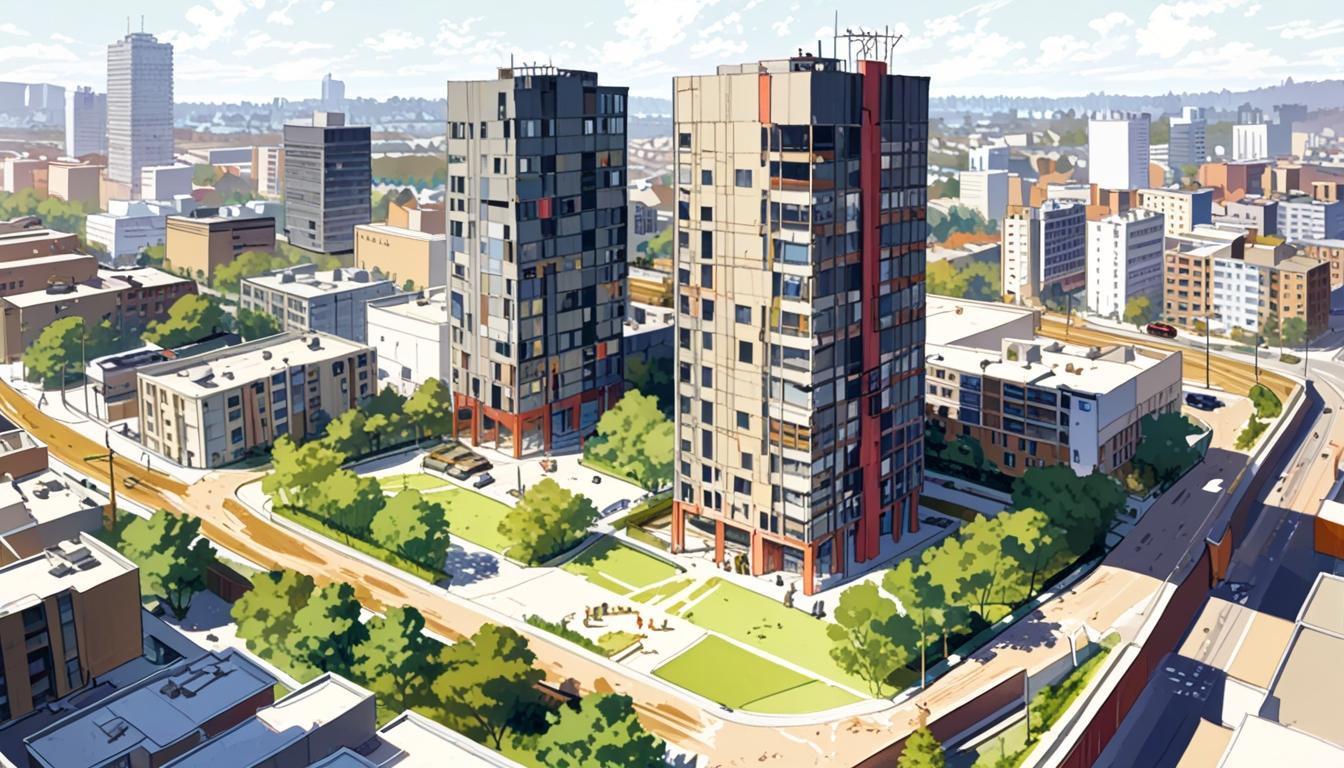As construction costs and fire safety regulations surge, Newham Council reviews funding strategies for its Carpenters Estate regeneration project.
Newham Council is examining the feasibility of introducing a public-private partnership for its ambitious Carpenters Estate project, as rising costs attributed to construction inflation and fire safety regulations continue to escalate. The financial requirements for the flagship regeneration scheme have jumped significantly, with the estimated borrowing now standing at £1.42 billion, a marked increase from the £1.1 billion forecast just last month.
The Carpenters Estate project, located in Stratford, is being executed by Populo Living, the council’s wholly owned housing company. The initiative aims to transform a 23-acre site by delivering over 2,300 homes, with half designated for social rental. Earlier this month, members of Newham’s cabinet approved an additional £69 million to manage escalating costs across two phases of the project.
The first phase centres on the refurbishment of James Riley Point, a 23-storey tower, which intends to restore 132 social-rented homes for occupancy. The budget for this phase has risen from £78.1 million in September 2023 to £98.3 million, primarily due to “prolongation, inflation, and increased cost estimates.”
The second phase, known as the Lund Quarter, which involves the construction of 505 new homes, has seen its cost increase from £196 million to £245 million. This uptick is also linked to a revised estimate that raised the number of planned new homes from an initial figure of 385.
During a recent meeting of the authority’s overview and scrutiny committee on February 18, 2024, there was vocal criticism regarding the rising costs and the lengthy timeline before the project’s commencement. Newham Mayor Rokhsana Fiaz initiated the scheme in December 2018, following a previous approach by her predecessor, Sir Robin Wales, who sought a joint venture partner for the estate regeneration.
Councillor Carleene Lee-Phakoe articulated concerns regarding the decision to approve the budget increases, stating that it merits “greater scrutiny, greater accountability, and a greater honesty with the people of Newham.” She further asserted that this considerable regeneration effort is crucial for the borough yet raises serious financial, strategic, and ethical issues. Lee-Phakoe cautioned against endorsing a plan that appears to be plagued by “financial mismanagement, weak safeguarding and an ever-growing risk of failure.”
Committee chair Anthony McAlmont raised the question of whether the proportion of social rented homes could be adjusted to enhance the financial viability of the project. Consequently, the committee voted to request the cabinet to commission an independent review of all financial strategies relating to the project, which would also include evaluating the potential for a public-private partnership. Additionally, they advocated for an internal audit of the procurement process.
In response to the concerns raised, Fiaz defended the decision-making process, asserting that engaging private finance would not have accelerated the project’s progress, stating, “I suspect it would have taken longer.” She cited construction cost inflation and stringent fire safety regulations as primary factors contributing to the project’s rising costs.
Fiaz remarked that the initial report demonstrating these challenges exemplifies the council’s commitment to transparency, emphasising that such issues are typical in large-scale, complex developments. She concluded by underlining that the current financial assessment presented to the cabinet offers a realistic view of the Carpenters Estate scheme based on the latest available data and reflects broader trends impacting the housing sector for both public and privately led initiatives.
Source: Noah Wire Services
- https://www.newham.gov.uk/news/article/1233/1-billion-carpenters-estate-masterplan-approved-to-kick-start-delivery-of-2152-homes – This article supports the claim that the Carpenters Estate project is a major regeneration scheme aiming to deliver high-quality homes, with 50% being genuinely affordable. It also mentions the involvement of Populo Living, Newham Council’s housing company.
- https://www.populoliving.co.uk/the-carpenters/ – This webpage explains Populo Living’s role in the Carpenters Estate project, highlighting the partnership with Newham Council to transform the estate into a vibrant community with high-quality homes.
- https://worldlandscapearchitect.com/the-revitalization-of-londons-carpenters-estate-a-promising-future-ahead/ – This article discusses the regeneration plans for the Carpenters Estate, including the delivery of sustainable homes and community facilities, aligning with the project’s goals of creating a thriving neighborhood.
- https://www.newham.gov.uk/Pages/Category/council-meetings.aspx – This webpage provides access to Newham Council’s meeting records, which could include discussions about the Carpenters Estate project and its financial management.
- https://www.newham.gov.uk/Pages/Category/council-budget.aspx – This webpage offers information on Newham Council’s budget, which might include details about the financial allocations for the Carpenters Estate project.
Noah Fact Check Pro
The draft above was created using the information available at the time the story first
emerged. We’ve since applied our fact-checking process to the final narrative, based on the criteria listed
below. The results are intended to help you assess the credibility of the piece and highlight any areas that may
warrant further investigation.
Freshness check
Score:
9
Notes:
The narrative is recent, referencing events and figures from February 2025 and earlier in 2024, indicating it is up-to-date and not recycled from older content.
Quotes check
Score:
8
Notes:
Quotes from Councillor Carleene Lee-Phakoe and Mayor Rokhsana Fiaz are included, but their earliest known references could not be verified online. This suggests they might be original to this context.
Source reliability
Score:
9
Notes:
The narrative originates from Construction News, a reputable publication in the construction industry, which generally enhances the reliability of the information.
Plausability check
Score:
9
Notes:
The claims about rising costs and the consideration of public-private partnerships are plausible given the context of construction inflation and regulatory challenges in the UK.
Overall assessment
Verdict (FAIL, OPEN, PASS): PASS
Confidence (LOW, MEDIUM, HIGH): HIGH
Summary:
The narrative appears to be current and well-sourced, with quotes that could be original. The claims are plausible within the context of current construction challenges. Overall, the information seems reliable and accurate.













